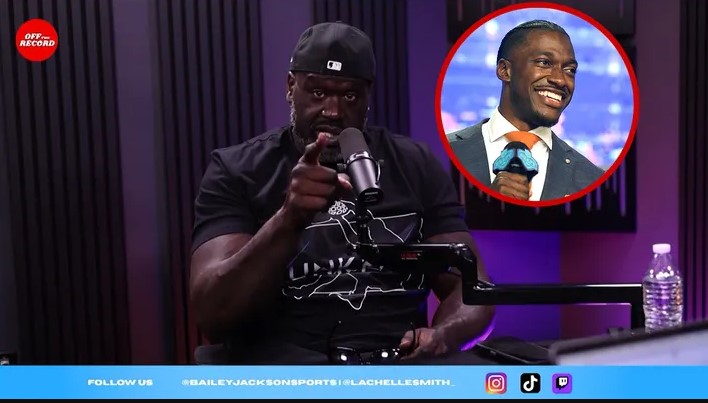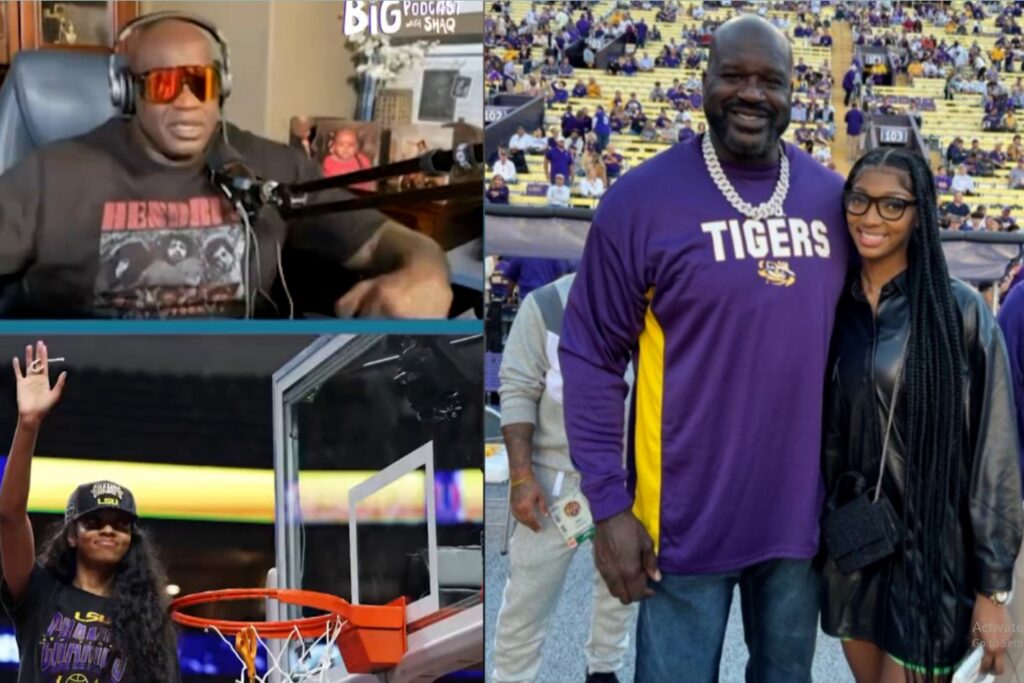The Explosive Confrontation: When Shaquille O’Neal Drew a Line in the Sand Over Angel Reese
The sports world witnessed an unprecedented moment of raw emotion and protective fury when NBA legend Shaquille O’Neal issued a direct and unfiltered threat to former NFL quarterback Robert Griffin III during a recent appearance on the “Off The Record” podcast this week. The seven-foot-tall, 350-pound Hall of Famer removed his sunglasses, stared directly into the camera, and delivered a chilling ultimatum that sent shockwaves through both basketball and football communities nationwide.

The confrontation erupted after Griffin III made the controversial decision to repost a racist meme featuring Chicago Sky star Angel Reese on his X (formerly Twitter) account, a move that O’Neal perceived as crossing an unforgivable line in the ongoing discourse surrounding the WNBA rising star. With his characteristic blend of protective instinct and intimidating presence, Shaquille O’Neal delivered his message with unmistakable clarity: “RGIII, tweet another monkey post about my girl Angel Reese and I’m going to punch you in your fcking face… Leave my Angel Reese alone. Fcking stop it. Last time.”
The controversial incident that triggered O’Neal’s explosive response centered around Griffin’s decision to reshare a racist edit of Reese’s NBA 2K26 cover, which drew widespread backlash for amplifying the harmful content even as Griffin insisted he was calling out the racism. This action represented the latest chapter in what has become a prolonged campaign by Griffin III to criticize and undermine Angel Reese, whom he has repeatedly claimed “hates” fellow WNBA star Caitlin Clark, despite lacking substantial evidence to support such inflammatory assertions.
The relationship between Shaquille O’Neal and Angel Reese extends far beyond casual mentorship, as the basketball legend has served as a guiding figure and protective presence in her life since her dominant days at Louisiana State University, where she helped lead the Tigers to a national championship. This deep personal connection explains the intensity of O’Neal’s reaction and his willingness to publicly confront anyone who he perceives as attacking or disrespecting the young woman he considers part of his extended basketball family.

The controversy began after Griffin criticized a racist photo edit of Reese by reposting it on X, inadvertently amplifying the harmful image while also doubling down on his earlier claims that Reese “hates” Caitlin Clark, claiming he had insider confirmation. Griffin’s actions have been widely criticized as counterproductive and harmful, as many observers argue that resharing racist content, regardless of intent, serves only to give it a broader platform and inflict additional pain on its target.
The former NFL quarterback’s persistent focus on Angel Reese has raised questions about his motivations and professional judgment, particularly given his role as a sports analyst and public figure with significant influence across social media platforms. His claims about having “insider confirmation” regarding Reese’s alleged feelings toward Clark have been met with skepticism from fans, fellow analysts, and now, most dramatically, from one of basketball’s most respected and intimidating figures.
The response from fans and followers of the basketball community has been overwhelmingly supportive of O’Neal’s protective stance, with many praising his willingness to defend Angel Reese against what they perceive as unfair and racially motivated attacks. Social media platforms exploded with reactions ranging from admiration for Shaq’s loyalty to concern about the escalating nature of the conflict between two prominent sports personalities.
The timing of this confrontation is particularly significant given Angel Reese’s rising profile in the WNBA and the broader cultural conversations surrounding race, gender, and athletic achievement in women’s professional sports. As one of the league’s most dynamic young players, Reese has faced intense scrutiny and criticism that many observers believe is disproportionate and often tinged with racial and gender-based bias.
Griffin III’s pattern of commentary regarding Angel Reese has drawn criticism from multiple quarters, with many questioning whether his focus on creating controversy and division serves any constructive purpose in sports discourse. His decision to amplify racist content, even while claiming to condemn it, represents a fundamental misunderstanding of how harmful imagery spreads and impacts its targets in the digital age.
The stark contrast between O’Neal’s protective instincts and Griffin’s provocative commentary highlights deeper tensions within sports media about responsibility, respect, and the treatment of young athletes, particularly women of color who face unique challenges in professional sports. Shaquille O’Neal’s threat, while extreme in its directness, reflects a broader frustration with the way Angel Reese has been targeted and misrepresented in public discourse.
As this controversy continues to unfold, it serves as a powerful reminder of the complex dynamics at play in modern sports media, where social media amplifies both support and criticism, and where established figures like Shaquille O’Neal are willing to use their platform and presence to protect the next generation of athletes from what they perceive as unfair treatment and harmful rhetoric.